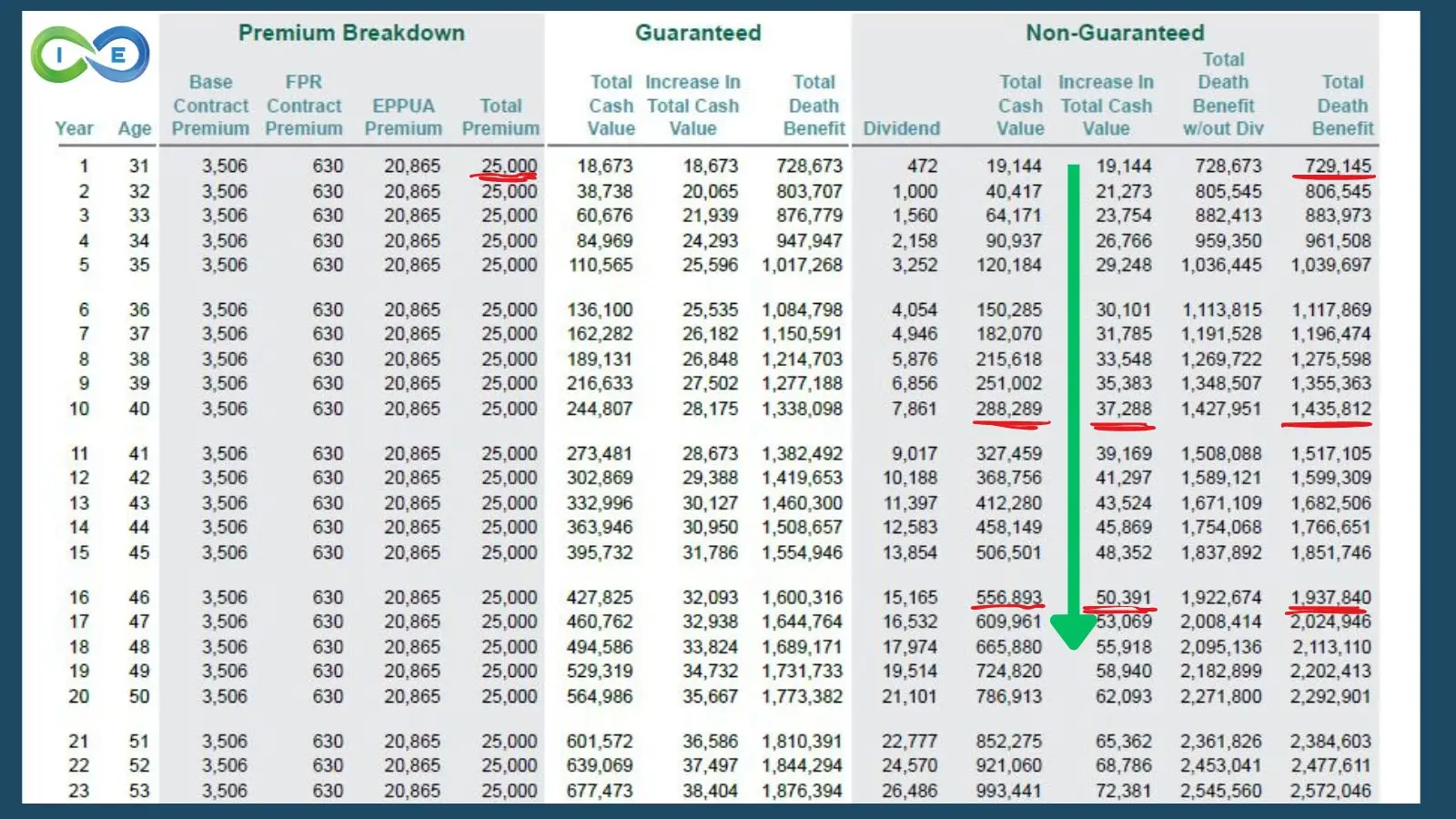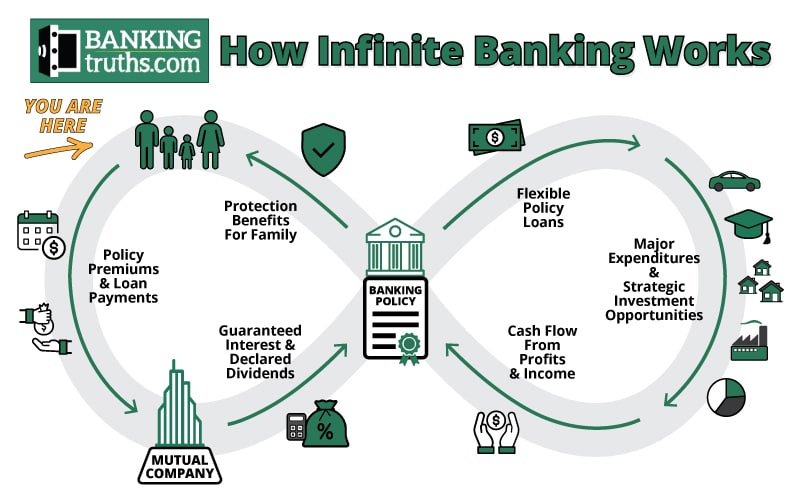All Categories
Featured
Table of Contents
The downsides of boundless financial are commonly neglected or not pointed out in any way (much of the info available concerning this concept is from insurance coverage representatives, which may be a little biased). Only the cash worth is expanding at the dividend rate. You additionally have to spend for the cost of insurance, charges, and expenditures.

Every irreversible life insurance plan is different, but it's clear somebody's total return on every buck spent on an insurance coverage product might not be anywhere close to the returns rate for the policy.
Visa Infinite Rewards Royal Bank
To give a really fundamental and hypothetical instance, let's think someone is able to gain 3%, on average, for every buck they spend on an "limitless banking" insurance product (after all expenditures and fees). If we think those bucks would be subject to 50% in taxes amount to if not in the insurance coverage item, the tax-adjusted price of return can be 4.5%.

We think more than ordinary returns on the whole life product and a really high tax price on dollars not put into the plan (which makes the insurance product look better). The reality for many folks might be worse. This fades in contrast to the long-lasting return of the S&P 500 of over 10%.
Boundless financial is an excellent item for agents that sell insurance coverage, however might not be optimum when compared to the more affordable choices (with no sales people gaining fat compensations). Below's a breakdown of several of the various other supposed advantages of infinite banking and why they may not be all they're gone crazy to be.
Cibc Aerogold Visa Infinite Online Banking
At the end of the day you are buying an insurance policy product. We enjoy the security that insurance policy provides, which can be gotten a lot less expensively from an affordable term life insurance policy policy. Overdue loans from the policy may also reduce your survivor benefit, decreasing one more degree of defense in the plan.
The principle just works when you not only pay the substantial premiums, yet utilize added cash money to purchase paid-up enhancements. The opportunity expense of every one of those bucks is incredible extremely so when you might rather be purchasing a Roth Individual Retirement Account, HSA, or 401(k). Also when compared to a taxed investment account or perhaps a cost savings account, limitless banking may not supply comparable returns (compared to spending) and similar liquidity, gain access to, and low/no charge framework (contrasted to a high-yield interest-bearing accounts).
With the surge of TikTok as an information-sharing system, monetary advice and approaches have found an unique means of spreading. One such method that has been making the rounds is the boundless financial idea, or IBC for short, gathering endorsements from stars like rapper Waka Flocka Fire. Nonetheless, while the technique is presently prominent, its origins map back to the 1980s when economist Nelson Nash introduced it to the globe.

Within these plans, the cash money worth grows based on a rate set by the insurance company. As soon as a considerable cash money worth collects, insurance holders can get a cash money worth funding. These fundings vary from conventional ones, with life insurance policy acting as collateral, indicating one might lose their coverage if borrowing excessively without appropriate money worth to sustain the insurance coverage costs.
Whole Life Insurance Bank On Yourself
And while the attraction of these plans appears, there are inherent restrictions and risks, requiring thorough cash money worth tracking. The strategy's authenticity isn't black and white. For high-net-worth individuals or entrepreneur, particularly those utilizing methods like company-owned life insurance coverage (COLI), the advantages of tax breaks and substance development can be appealing.
The attraction of boundless financial doesn't negate its challenges: Price: The foundational need, a permanent life insurance policy plan, is pricier than its term counterparts. Eligibility: Not every person certifies for entire life insurance coverage because of extensive underwriting procedures that can exclude those with specific wellness or way of living problems. Intricacy and risk: The elaborate nature of IBC, combined with its risks, may deter several, particularly when simpler and less risky alternatives are available.
Assigning around 10% of your monthly revenue to the plan is simply not viable for many people. Part of what you review below is simply a reiteration of what has currently been said over.
So before you obtain into a scenario you're not prepared for, recognize the following initially: Although the idea is generally marketed as such, you're not really taking a financing from yourself - bank on yourself ripoff. If that held true, you wouldn't need to settle it. Rather, you're obtaining from the insurance provider and have to settle it with passion
Infinite Banking System Review
Some social media articles advise utilizing cash money value from entire life insurance to pay down debt card financial obligation. When you pay back the lending, a part of that interest goes to the insurance coverage business.
For the very first numerous years, you'll be paying off the compensation. This makes it incredibly difficult for your policy to gather value during this moment. Entire life insurance policy expenses 5 to 15 times a lot more than term insurance. Lots of people just can not afford it. So, unless you can pay for to pay a couple of to several hundred bucks for the following years or more, IBC will not function for you.
If you require life insurance coverage, here are some important ideas to consider: Think about term life insurance coverage. Make certain to shop about for the ideal price.

Boundless financial is not a services or product used by a certain institution. Boundless banking is a method in which you get a life insurance policy plan that collects interest-earning cash money value and secure car loans versus it, "borrowing from yourself" as a resource of funding. Eventually pay back the loan and begin the cycle all over again.
Pay plan costs, a section of which develops cash money value. Money value earns worsening interest. Take a lending out versus the plan's money worth, tax-free. Pay back loans with rate of interest. Cash money worth gathers again, and the cycle repeats. If you utilize this principle as intended, you're taking money out of your life insurance coverage plan to purchase everything you 'd require for the rest of your life.
Latest Posts
Build Your Own Bank
How To Invest In Life Insurance Like Banks
Bring Your Own Bank: Expanding The Ways Companies ...